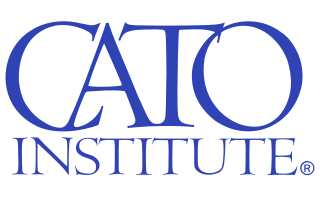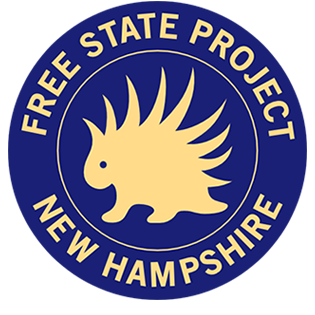Individualism is the moral stance, political philosophy, ideology and social outlook that emphasizes the intrinsic worth of the individual. Individualists promote the exercise of one's goals and desires and to value independence and self-reliance and advocate that interests of the individual should achieve precedence over the state or a social group while opposing external interference upon one's own interests by society or institutions such as the government. Individualism is often defined in contrast to totalitarianism, collectivism and more corporate social forms.
Anarcho-communism, also known as anarchist communism, is a political philosophy and anarchist school of thought which advocates the abolition of the state, capitalism, wage labour, social hierarchies and private property. It retains respect for personal property along with collectively-owned items, goods and services. It supports common ownership of the means of production and direct democracy as well as a horizontal network of workers' councils with production and consumption based on the guiding principle "From each according to his ability, to each according to his needs". Some forms of anarcho-communism such as insurrectionary anarchism are strongly influenced by egoism and radical individualism, believing anarcho-communism to be the best social system for the realization of individual freedom. Most anarcho-communists view anarcho-communism as a way of reconciling the opposition between the individual and society.
Libertarian socialism, also referred to as anarcho-socialism, anarchist socialism, free socialism, stateless socialism, socialist anarchism and socialist libertarianism, is an anti-authoritarian, anti-statist and libertarian political philosophy within the socialist movement which rejects the state socialist conception of socialism as a statist form where the state retains centralized control of the economy. Overlapping with anarchism and libertarianism, libertarian socialists criticize wage slavery relationships within the workplace, emphasizing workers' self-management and decentralized structures of political organization. As a broad socialist tradition and movement, libertarian socialism includes anarchist, Marxist and anarchist or Marxist-inspired thought as well as other left-libertarian tendencies. Anarchism and libertarian Marxism are the main currents of libertarian socialism.

Murray Newton Rothbard was an American economist of the Austrian School, economic historian and political theorist. Rothbard was a founder and leading theoretician of anarcho-capitalism and a central figure in the 20th-century American libertarian movement. He wrote over twenty books on political theory, history, economics, and other subjects.

The Cato Institute is an American libertarian think tank headquartered in Washington, D.C. It was founded in 1977 by Ed Crane, Murray Rothbard, and Charles Koch, chairman of the board and chief executive officer of Koch Industries. Cato was established to have a focus on public advocacy, media exposure and societal influence. According to the 2017 Global Go To Think Tank Index Report, Cato is number 15 in the "Top Think Tanks Worldwide" and number 10 in the "Top Think Tanks in the United States".

The Free State Project (FSP) is an American political migration movement founded in 2001 to recruit at least 20,000 libertarians to move to a single low-population state in order to make the state a stronghold for libertarian ideas. The New Hampshire Union Leader reports the Free State Project is not a political party, but a nonprofit organization.

Shachtmanism is the form of Marxism associated with Max Shachtman (1904–1972). It has two major components: a bureaucratic collectivist analysis of the Soviet Union and a third camp approach to world politics. Shachtmanites believe that the Stalinist rulers of proclaimed socialist countries are a new ruling class distinct from the workers and reject Trotsky's description of Stalinist Russia as a "degenerated workers' state".
Paleolibertarianism was a libertarian political activism strategy. It was developed by American anarcho-capitalist theorists Murray Rothbard and Lew Rockwell in the American political context after the end of Cold War. From 1989 to 1995, they sought to communicate libertarian notions of opposition to government intervention using messages accessible to working and middle-class people of the time. This approach, usually identified as right-wing populism, was intended to radicalize citizens against the state. The name they chose for this style of activism evoked the roots of modern libertarianism, hence the prefix paleo. That founding movement was American classical liberalism, which shared the anti-war and anti-New Deal sentiments of the Old Right in the first half of the 20th century.
In American politics, a Libertarian Republican is a politician or Republican Party member who has advocated Libertarian policies while typically voting for and being involved with the Republican Party.
Left-libertarianism, also known as egalitarian libertarianism, left-wing libertarianism or social libertarianism, is a political philosophy and type of libertarianism that stresses both individual freedom and social equality. Left-libertarianism represents several related yet distinct approaches to political and social theory. In its classical usage, it refers to anti-authoritarian varieties of left-wing politics such as anarchism, especially social anarchism, whose adherents simply call it libertarianism, Communalism, and Libertarian Marxism, which are collectively termed libertarian socialism. A portion of the left wing of the green movement, including adherents of Murray Bookchin's social ecology, are also generally considered left-libertarian.
Libertarianism is a political philosophy that upholds liberty as a core value. Libertarians seek to maximize autonomy and political freedom, and minimize the state; emphasizing free association, freedom of choice, individualism and voluntary association. Libertarians share a skepticism of authority and state power, but some libertarians diverge on the scope of their opposition to existing economic and political systems. Various schools of libertarian thought offer a range of views regarding the legitimate functions of state and private power, often calling for the restriction or dissolution of coercive social institutions. Different categorizations have been used to distinguish various forms of libertarianism. Scholars distinguish libertarian views on the nature of property and capital, usually along left–right or socialist–capitalist lines.
In the United States, libertarianism is a political philosophy promoting individual liberty. According to common meanings of conservatism and liberalism in the United States, libertarianism has been described as conservative on economic issues and liberal on personal freedom, often associated with a foreign policy of non-interventionism. Broadly, there are four principal traditions within libertarianism, namely the libertarianism that developed in the mid-20th century out of the revival tradition of classical liberalism in the United States after liberalism associated with the New Deal; the libertarianism developed in the 1950s by anarcho-capitalist author Murray Rothbard, who based it on the anti-New Deal Old Right and 19th-century libertarianism and American individualist anarchists such as Benjamin Tucker and Lysander Spooner while rejecting the labor theory of value in favor of Austrian School economics and the subjective theory of value; the libertarianism developed in the 1970s by Robert Nozick and founded in American and European classical liberal traditions; and the libertarianism associated to the Libertarian Party which was founded in 1971, including politicians such as David Nolan and Ron Paul.
Right-libertarianism, also known as libertarian capitalism or right-wing libertarianism, is a political philosophy and type of libertarianism that supports capitalist property rights and defends market distribution of natural resources and private property. The term right-libertarianism is used to distinguish this class of views on the nature of property and capital from left-libertarianism, a type of libertarianism that combines self-ownership with an egalitarian approach to natural resources. In contrast to socialist libertarianism, right-libertarianism supports free-market capitalism. Like most forms of libertarianism, it supports civil liberties, especially natural law, negative rights, and a major reversal of the modern welfare state.
Anarchism is generally defined as the political philosophy which holds the state to be undesirable, unnecessary and harmful as well as opposing authority and hierarchical organization in the conduct of human relations. Proponents of anarchism, known as anarchists, advocate stateless societies based on non-hierarchical voluntary associations. While anarchism holds the state to be undesirable, unnecessary and harmful, opposition to the state is not its central or sole definition. Anarchism can entail opposing authority or hierarchy in the conduct of all human relations.
Libertarian conservatism, also referred to as conservative libertarianism and conservatarianism, is a political philosophy that combines conservatism and libertarianism, representing the libertarian wing of conservatism and vice versa.
The following outline is provided as an overview of and topical guide to anarchism, generally defined as the political philosophy which holds the state to be undesirable, unnecessary and harmful, or alternatively as opposing authority and hierarchical organization in the conduct of human relations. Proponents of anarchism, known as anarchists, advocate stateless societies or non-hierarchical voluntary associations.
Liberty International is a non-profit, libertarian educational organization based in San Francisco. It encourages activism in libertarian and individual rights areas by the 'freely chosen strategies' of its members. Its history dates back to 1969 as the Society for Individual Liberty, founded by Don Ernsberger and Dave Walter. The previous name (ISIL) was adopted in 1989 after a merger with Libertarian International was coordinated by Vincent Miller, who became president of the new organization.
The Libertarian Party in the United States is composed of various factions, sometimes described as "left" and "right", although many libertarians reject use of these terms to describe the political philosophy.

Transhumanist politics constitutes a group of political ideologies that generally express the belief in improving human individuals through science and technology.
Vince Miller was Canadian libertarian who was one of the founders of the Libertarian Party of Canada in 1975, and later founded Libertarian International in 1980, which by 1989 had merged with Society for Individual Liberty to create the Society for Individual Liberty (ISIL). Born in Ontario Canada, Miller was the editor of the Libertarian Party of Canada's magazine Libertarian Option.




